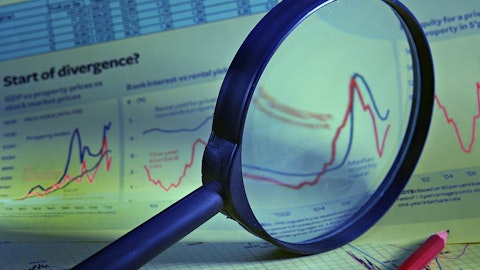Brendan O’Brien: Good morning. This is Brendan O’Brien filling in for Steven. I guess to start, Gary, congrats on the new role and best of luck. It’s been a pleasure working with you. I guess turning over to my question, just at the start, I wanted to just ask on Europe. From what we can see in the public data, it seems like activity in the region has been running at similar levels to the U.S. However, we’ve seen some bifurcation in the strength of the U.S. and European economies. Given these trends, I was hoping you could compare your dialogues with U.S. and European clients and whether there’s any differences in the tone of dialogues following the conflict in the Middle East?
Andrew Bednar: So thanks for the question. Broadly on volumes, of course, you can see the data as much as we see it. Europe is a bit weaker than the U.S. in terms of what we see as a recovery in place, albeit not as strong as we’d like to see it. European activity is lagging. I think in terms of the conversations that we see both through the course of the recovery, but also post the events of October, we don’t see a material difference in the nature of the dialogue at all. And if anything, in times of complexity and increasing range of uncertainty in the marketplace, that’s when our business thrives. And it sometimes takes time to see the revenue effects from those types of activities, but when decision-makers are pressed with having to move forward a business and make critical strategic and financial decisions in the midst of geopolitical risks of credit market, which is still quite challenging, and generally, just this widening of the range of uncertainty as people think about their scenario planning, that’s when advisers get called.
And so we feel good about the nature of the dialogue. We feel good about our franchise. And complexity, in our case, is a friend to the business.
Brendan O’Brien: That’s helpful color. I guess for my follow-up, I wanted to ask on energy, which is an area of strength for you through TPH. You’ve seen a flurry of activity in the energy space over the past couple of months. So it seems like these firms are pivoting from returning capital to shareholders to investing in the business through inorganic growth. I wanted to get a sense as to what you’re hearing from your clients in the sector. And if you think this trend of elevated activity could persist?
Andrew Bednar: Yes. That’s a good question. We do think that there is a change in thinking about how to deploy capital in the energy patch, and we do think that there will be additional transactions that follow on from the two or three significant transactions that occurred in the last quarter. And so we are getting prepared for that and getting positioned for that and believe that there’s more to come.
Brendan O’Brien: All right. Thanks for taking my questions.
Andrew Bednar: Thank you.
Operator: That concludes the question-and-answer portion of today’s call. So I’d like to turn the floor back over to Andrew Bednar for closing remarks.
Andrew Bednar: Great. Thank you, operator. And again, thank you, Gary, and wishing you best of luck on your next endeavor. Obviously, the support from the analyst community is very clear. And thank you all for your continuing support of Perella Weinberg, and because we won’t talk again until ’24, I want to wish everyone a happy holiday season and a reflective one for all of you, and look forward to speaking again in early 2024. Thank you.
Operator: Thank you, ladies and gentlemen. This concludes today’s Perella Weinberg third quarter 2023 earnings conference call. You may disconnect at any time.
Follow Perella Weinberg Partners (NASDAQ:PWP)
Follow Perella Weinberg Partners (NASDAQ:PWP)
Receive real-time insider trading and news alerts


